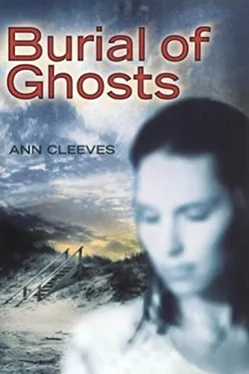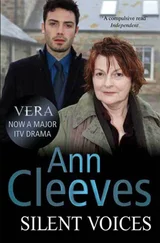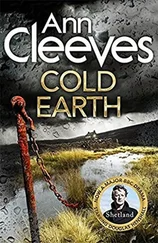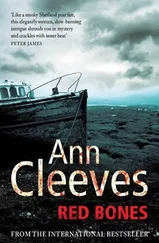
Ann Cleeves
Burial of Ghosts
© 2003
My nightmares feature knives and blades and blood. I don’t do falling down holes or being chased through deserted streets. And though usually I dream in black and white, the blood is very red, glossy, and it slides out from the rest of the scene, which is flat and dull. The worst thing is that when I wake, I realize it wasn’t a dream at all.
I’m in Blyth. It’s market day and I’m there to shop for Jess. There’s a stall where she buys all her fruit and veg – she knows the bloke who runs it and he always gives her a good deal. It’s mid-morning, with lots of people about. It’s not long before Christmas and everyone’s in the mood when they have to buy, even if the stuff’s crap, otherwise they feel they’re not prepared. A foggy, drizzly day, and cold with it. There’s a raw east wind which cuts into the skin. But it doesn’t draw blood. Not like the scissors I buy in Woolworths. I ask the assistant to take them out of the plastic packet to check that they’re sharp. I run my thumb across the blade and there’s a small red line and then tiny, perfectly round red drops like jewels. I fumble with the money when I pay, not because of the cut, which is already healing, but because my hands are freezing.
From Woolworths I wander back into the market square to pick up Jess’s vegetables. I stop for a couple of minutes to look at the cassettes and CDs and chat to the ageing punk who sells them, and again to buy a quarter of a pound of coconut ice from the sweetie stall. I have a very sweet tooth. It’s all still in pounds and ounces, of course. There are no kilos in Blyth. Then I notice a lad coming towards me with a pile of Big Issue s. He’s wearing combat trousers and big boots, expensive boots, new not second-hand. I walk round him, trying not to catch his eye. Why? Because his thin face reminds me of someone I don’t want to think about. A lad called Nicky with a poet’s face. Because I don’t have a pound and I don’t want to wait for change. And anyway he must be working some sort of scam because of the boots.
I’m almost at the vegetable stall. There’s a smell of cabbage leaves and oranges. Someone behind me touches my shoulder.
‘ Big Issue , Miss?’ Aggressive, sneering, so close I can feel his breath on my neck.
I swing round and stab him in the fleshy part of his upper arm with the scissors. He’s a Blyth hard man, only wearing a sweatshirt despite the cold. I get him first go, feel the rip of the skin and the crunch of the bone as the blade hits off it. But when I lift my arm to strike again, someone holds me back. The bloke from the veg stall recognizes me and shouts, and the crowd joins in. They’re all screaming. The lad has dropped the pile of papers. The blood soaks through the grey sweatshirt and spatters the newsprint in slow motion. Black and white and red all over. Like the joke.
In Morocco I didn’t dream at all.
It was midday and hot, only April but there’d been no rain all winter and the river beds were dry. Not that you’d believe that here, where the fields were irrigated and green. Some stream in the mountains had been tamed and channelled through open wooden pipes to a reservoir, then to the tiny fields, the date palms and the hedges of tamarisk, jacaranda and bougainvillaea. The colours of the flowers were exploding in the sunlight. Like it was some sort of trip or mystical experience. Like I was in paradise.
So I was in paradise, riding a donkey led by an eight-year-old beauty with shiny black eyes, a torn skirt and bare feet called Latifa. An Australian backpacker who was staying in my hotel had sent me there. He’d given the directions to the palmery.
‘Worth a visit,’ he’d said, super-cool. ‘If you want to get out of town. Nice views.’
He hadn’t mentioned it was on the tripper route and when I got there, bouncing the clapped-out Renault I’d hired for a week over the rocky track, there were two tour coaches from Agadir spewing out German housewives in shorts and vests. After a week on the beach, their skin was the same startling pink as the bougainvillaea petals. I’d almost turned round and gone back. Not my scene. I’m a traveller, not a tourist. I don’t do crowds. Then Latifa had come up, dragging the donkey behind her, hustling.
‘You like donkey ride, Miss?’ Some sixth sense telling her I was British. I looked at her over my shades.
‘How much?’
She named a price in dirhams. The equivalent of three pounds, the first bargaining move.
‘OK.’ She was shocked. Even tourists knew they were supposed to haggle. ‘But I don’t want to go where they’re going.’ I nodded towards the Germans, who were being hoisted onto donkeys of their own. ‘Somewhere quiet.’
‘No problem. They go to hotel. Drink Coca-Cola. Eat big meal. Tagine. Couscous. Bread. Eat, eat, eat.’ She puffed out her cheeks. Not a credible imitation of a fat German, but I knew what she was getting at. She clapped her hand over her mouth, thinking her honesty would cost her business, thinking I’d be offended, that we were all members of the same tribe.
‘That’s OK, then.’
She still looked at me as if I were crazy for not trying to get a better price. I got out of the car. It would be like a sauna when I returned. The coaches had parked in the only shade.
And she took me into paradise. She led me down the sandy paths round the little fields into that light and that colour. It was like swimming into a stained-glass window only there was sound too – everywhere bird-song and the humming of insects. I was as much a part of the jacaranda and the water trickling through the wooden pipes. More than that, it was as if the whole scene had been laid out for my enjoyment. For a moment I lost myself in it. I heard Latifa’s voice, as if from a distance, chatting about her family and school, hoping maybe for a few extra dirhams tip for being friendly. Because I’d already proved I was an easy touch.
Driving back to the town I made up my mind it was time to go home. I’d stopped being angry. And after today everything else would be an anticlimax. In Taroudannt I returned my car to the garage and organized a ticket for a bus to Marrakech. The next day I’d begin to make my way back. But slowly, because I’d need to get used to the idea. I’d lost the habit of making plans.
Later I walked through the streets which had already become familiar. My path took me past the bread shop, where the flat loaves were wrapped in a grey blanket, and the shop selling acacia twigs for firewood, past the souk, avoiding the skinny boys chasing goats and the young men with soft, dark eyes who wanted to practise their English or sell me a carpet, or a silver Berber bracelet, to the poshest hotel in town. The one where the German tourists would stay if they had more class. I ate an expensive dinner on the terrace and drank most of a bottle of wine. Then I swam in the pool, which was built into the red stone of the city wall and surrounded by a garden. More jacaranda, more palms and vines. I swam until it was almost dark and I was the only person in the water.
I walked back to the place I was staying, a not-so-posh hotel which got its mention in the Rough Guide for being central and providing reasonable value for money. I walked slowly, knowing it was the last time. Outside the cafés old men with stern faces drank coffee. Bats dipped in and out of holes in the wall. The muezzins were calling the faithful to prayer from the mosque on the square. The Australian backpacker was waiting for me alone and hopeful by the bar of our hotel. I bought him a beer, then went to bed. Without him. You’d have thought I’d kicked him in the gut.
Читать дальше













